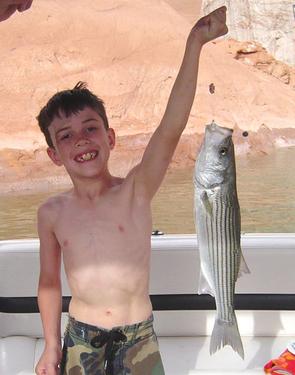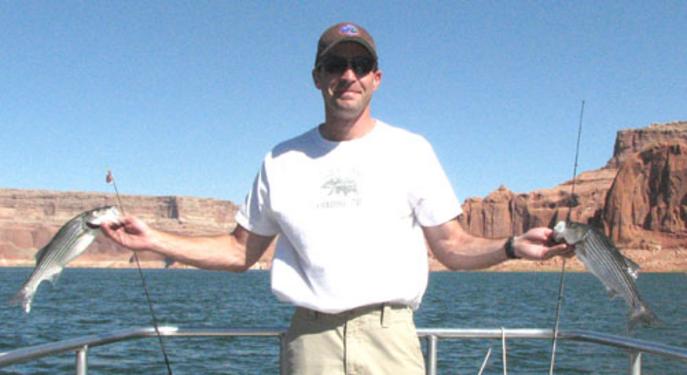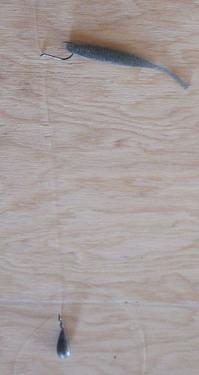Lake Powell Fish Report 07-11-07
Lake Powell

by Wayne Gustaveson
7-11-2007
Website
Lake Powell is now declining. That is not all bad when creature comforts are considered. Most of the troublesome drift wood will become stranded on shore within a few weeks. Weed covered beaches will open up into ever increasing clear sandy areas. Hot weather will be mitigated by afternoon clouds as monsoon flows begin.
Fishing? That will be about the same as it has been. Air temperatures have been in the 100's and catch of stripers is also in triple digits if the holding spot for the resting school is discovered. Striped bass are holding in deep, cool water where energy can be conserved while waiting for a feeding opportunity. An anchovy chum shower wakes the school and draws them off the bottom and toward the surface as each fish tries to get to the next drifting morsel before his school mate.
A good fish finder is very helpful in locating these resting schools. Graph the edge of the main channel or canyon. Start shallow and then look on the drop off as the boat heads to deep water. Zigzag from shallow to deep water looking for the distinct school signature signifying many resting fish hovering just off the bottom. It may take 10-15 minutes to find a likely looking school but time spent graphing may be rewarded with instant hookups and long lasting fishing fun.
When the school is detected try anchoring so the boat is right over the school. The easiest way to do this is to mark the school with a float. Then turn the boat into the wind, move forward the same distance as bottom depth on the graph and drop anchor. Make sure the anchor catches on bottom, then drift back letting out line until the boat is very near the float. It may take 2-3 tries to get it just right. The good thing about stationary summer striper schools is lack of movement. They will wait where last seen while the boat gets in position.
Next chum about 5-6 anchovies cut in quarter inch slices. Broadcast chum pieces all around the boat. The last action required is to place a one-inch chunk of bait on a hook or jig head. Toss the bait in the water and get ready for action. Make sure the first fish or two is played at depth for an extended period. Try to get the second fish on before the first one is landed. Once the school is invigorated in this manner they seem to stay in the same spot as long as a trickle of chum continues to fall. Toss in a few pieces each time the hook is rebaited for best results. Make sure to catch the first fish that bites. Missing the first fish or two sometimes allows the school to follow the fleeing fish and the entire school disappears. If that happens start the search grid over and repeat the process.
Bass fishing is still steady each morning and evening. Smallmouth have moved to the ends of quick drops such as reefs and terminal points. The magic depth is 20 feet. Slick rock basins and steep cliffs hold bass in these warm water conditions. Free-floating plastic bait on a split shot or Carolina rig is an effective presentation. A sliding sinker rig is just as good. The key ingredient is to move the bait slowly and rest often. Fish in summer act like winter fish and take their time looking at the bait before tasting it.
FISHING TIP:Drop shot rig is featured (left).?? The weight maintains bottom contact while the plastic bait suspends (swims) horizontally above the bottom The bait goes up and down slightly as the rod tip gently moves. Fish this slowly for bass.?? Keep line tight enough to feel the bite but not too tight to restrict bait movement.??
A free-running sliding sinker in front of an off set worm hook works in similar fashion.?? The bait can move independently from the weight.?? The bait swims a bit just off bottom. Again fish this slowly.?? "Think crayfish" darting when disturbed and then resting motionless on the bottom.??
NOTE:?? before I get any comments - Yes the sliding sinker should be put on the line so the pointy end is toward the rod tip - not the bait.?? Hey! it looked good in the garage!??????
Fishing? That will be about the same as it has been. Air temperatures have been in the 100's and catch of stripers is also in triple digits if the holding spot for the resting school is discovered. Striped bass are holding in deep, cool water where energy can be conserved while waiting for a feeding opportunity. An anchovy chum shower wakes the school and draws them off the bottom and toward the surface as each fish tries to get to the next drifting morsel before his school mate.
A good fish finder is very helpful in locating these resting schools. Graph the edge of the main channel or canyon. Start shallow and then look on the drop off as the boat heads to deep water. Zigzag from shallow to deep water looking for the distinct school signature signifying many resting fish hovering just off the bottom. It may take 10-15 minutes to find a likely looking school but time spent graphing may be rewarded with instant hookups and long lasting fishing fun.
When the school is detected try anchoring so the boat is right over the school. The easiest way to do this is to mark the school with a float. Then turn the boat into the wind, move forward the same distance as bottom depth on the graph and drop anchor. Make sure the anchor catches on bottom, then drift back letting out line until the boat is very near the float. It may take 2-3 tries to get it just right. The good thing about stationary summer striper schools is lack of movement. They will wait where last seen while the boat gets in position.
Next chum about 5-6 anchovies cut in quarter inch slices. Broadcast chum pieces all around the boat. The last action required is to place a one-inch chunk of bait on a hook or jig head. Toss the bait in the water and get ready for action. Make sure the first fish or two is played at depth for an extended period. Try to get the second fish on before the first one is landed. Once the school is invigorated in this manner they seem to stay in the same spot as long as a trickle of chum continues to fall. Toss in a few pieces each time the hook is rebaited for best results. Make sure to catch the first fish that bites. Missing the first fish or two sometimes allows the school to follow the fleeing fish and the entire school disappears. If that happens start the search grid over and repeat the process.
Bass fishing is still steady each morning and evening. Smallmouth have moved to the ends of quick drops such as reefs and terminal points. The magic depth is 20 feet. Slick rock basins and steep cliffs hold bass in these warm water conditions. Free-floating plastic bait on a split shot or Carolina rig is an effective presentation. A sliding sinker rig is just as good. The key ingredient is to move the bait slowly and rest often. Fish in summer act like winter fish and take their time looking at the bait before tasting it.
FISHING TIP:Drop shot rig is featured (left).?? The weight maintains bottom contact while the plastic bait suspends (swims) horizontally above the bottom The bait goes up and down slightly as the rod tip gently moves. Fish this slowly for bass.?? Keep line tight enough to feel the bite but not too tight to restrict bait movement.??
A free-running sliding sinker in front of an off set worm hook works in similar fashion.?? The bait can move independently from the weight.?? The bait swims a bit just off bottom. Again fish this slowly.?? "Think crayfish" darting when disturbed and then resting motionless on the bottom.??
NOTE:?? before I get any comments - Yes the sliding sinker should be put on the line so the pointy end is toward the rod tip - not the bait.?? Hey! it looked good in the garage!??????
Photos
< Previous Report Next Report >
< Previous Report
Next Report >

7-3-2007
Fishing is best very early in the morning and again late in the evening with night fishing being perhaps the...... Read More

6-27-2007
It's summer. Water surface is warm and fish have gone deep to cool off. But "deep" is a relative term....... Read More
More Reports
Lake Powell Fish report 07-03-07
Lake Powell
7-3-2007
Fishing is best very early in the morning and again late in the evening with night fishing being perhaps the...... Read More
Lake Powell Fish Report 06-27-07
Lake Powell
6-27-2007
It's summer. Water surface is warm and fish have gone deep to cool off. But "deep" is a relative term....... Read More
000




